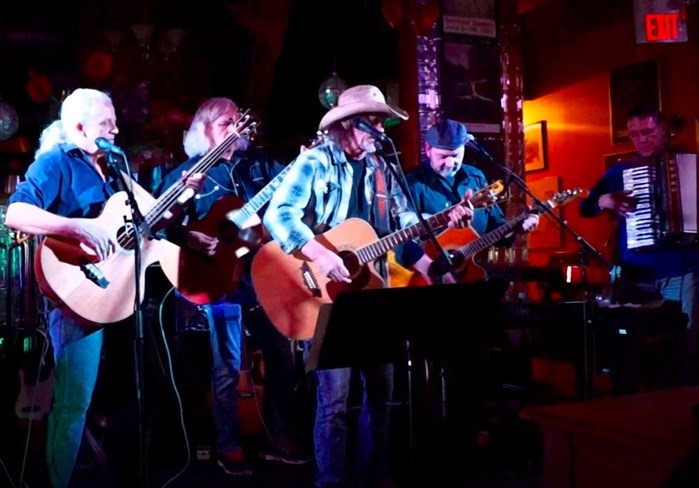
The Cruzeros are pictured in this contributed photo. A garden concert last weekend by local music legends The Cruzeros was shut down by Kelowna bylaw and a city councillor is calling for change to the noise bylaw.
Image Credit: Contributed
July 16, 2015 - 2:40 PM
KELOWNA - Nothing spurs political action like personal experience.
When Kelowna city bylaw officers shut down a garden concert last weekend by local legends The Cruzeros, city councillor Charlie Hodge was in the front row.
“It was not over the top. The didn’t even have the full band. There were no drums,” Hodge says.
When Hodge and The Cruzeros' Barry Mathers talked to the bylaw officers, they were told two strikes and you're out and this was the second time someone in the neighbourhood had called in a complaint. It was a little after 9 p.m.
When Mathers argued construction noise is tolerated until 10 p.m. — why not music? — he was stunned by her reply.
“Construction is essential and music is not, she said. I couldn’t believe it. I made her repeat it a few times. It certainly struck a nerve. So I can run a radial arm saw until 10 p.m. regardless of the neighbours, but someone can shut down music with a phone call. What if they just don’t like the music?”
Mathers took to Facebook to voice his opposition; Hodge took it a step further, bringing the matter up during councillor items at last Monday’s council meeting asking for a review of the noise bylaw.
“We were told she had no choice but to shut us down but I found out bylaw does have the option of weighing the situation so they either don’t know or they aren’t comfortable using their discretion," Hodge says. "I found out this idea people have that they can play music until 10 p.m. is a myth. They (bylaw officers) can come after you anytime."
Hodge does not blame the bylaw officers, suggesting instead the flawed language of the bylaw needs to be fixed putting a musical performance on par with construction in the noise bylaw.
“I would also point out that the band was working that night, like a construction worker might be working, but his work is now cut short because of one complaint," he says.
Mathers thinks a method to quantify a noise complaint would help.
“I’d like to see a definitive measure of the sound. If a cop catches you speeding, he does it with radar. Why not use something like a decibel meter," he says.
But Rob Mayne, corporate services director in charge of bylaw, says Mathers should be careful what he wishes for.
Under the current bylaw, officers have the latitude to decide if the source of a noise complaint constitutes an unreasonable or objectionable noise and can do it any time of the day or night.
“Having a set decibel reading might not meet the test where an officer might allow it,” he said.
Mayne says the city is quite comfortable with the discretion given bylaw officers to deal with the numerous noise complaints it receives each year.
“We train them, have regular watch briefs, we teach them how to mitigate those conflicts and try to make sure we have consistency on how it's applied," he says. "A fairly significant amount of time, we get compliance. We don’t like to write those $500 tickets.”
While an event can apply for an exemption to the city’s noise bylaw, Mayne admits it’s restricted to non-residential buildings and the city has no process for residential noise exemptions.
To contact the reporter for this story, email John McDonald at jmcdonald@infonews.ca or call 250-808-0143. To contact the editor, email mjones@infonews.ca or call 250-718-2724.
News from © iNFOnews, 2015